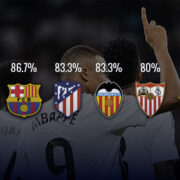We’ve all heard a lot about artificial intelligence (AI) and its variable use cases in sports. For some organizations, the term is already becoming part of their digital furniture. Only this month, the National Basketball Association (NBA) announced a raft of new features for the NBA mobile app, including the new AI-powered NBA Insights tool, which will be used to automate in-game updates in real-time throughout the 2024-25 season.
For others, while the NBAs of the world continue to innovate with the use of AI, this may seem out of reach. “AI” and “machine learning” could be construed simply as over-egged buzzwords in sport’s increasingly saturated technology market. On the contrary, whereas AI already plays a role in athlete-performance analysis and generative video production, it is fast being democratized within the front offices of sports organizations, too, and, at a fundamental level, is helping sports organizations harness their own data and digital transformation journeys.
To be an efficient, sustainable, and competitive business in today’s sports market, it’s no longer enough to host the best athletes and world-class events. As the industry digitalizes, it’s vitally important to innovate effectively to meet commercial goals and ensure your company is “future-ready” amid the surge in digital audiences and the influx of new technologies.
For the same reason, sports organizations and rights holders have sought to expand their digital presence by diversifying their own direct-to-consumer (D2C) inventories. While this has helped boost fan engagement by augmenting the owned “fan-funnel”, this has left many sports properties with siloed and costly data pools, caused by their disconnected technological ecosystems.
This problem was outlined by our Chief Operating Officer (COO) in N3XT Sports’ recently published Fan Engagement and Commercialization Guide 2024, which details how sports organizations optimize their digital assets and technological infrastructure to generate commercial value at every stage of the fan funnel without increasing their budget. “Technology adoption wasn’t guaranteed to drive the return on investment (ROI) many had hoped for,” Hisham writes, “[and] has sprung unforeseen operational barriers, such as disparities in data collection, which are prone within disconnected digital ecosystems and cause added operational costs.”
To remedy this problem and iron out these costly processes, just as other industries are charging ahead with investment in AI solutions to optimize productivity on the shop floor, in the wake of the Covid pandemic, the sports sector is also exploring new use cases for AI to help boost internal workflows and reduce operational spend while maintaining audience and commercial growth. This is a reality which is easier to reach than many sports executives might realize, contrary to widespread belief, and with the right support is firmly within their grasp.
USE CASES | HOW N3XT SPORTS CLIENTS LEVERAGE ARTIFICIAL INTELLIGENCE
Before we dive any deeper, let’s quickly break down two key terms: AI and digital transformation. You’ve probably heard these terms a hundred times, but what do they really mean for your organization?
- Artificial Intelligence (AI): At its core, AI is simply a set of technologies that allow machines to perform tasks that would normally require human intelligence. Think of AI as a tool that can analyze data, learn patterns, make decisions, and even predict outcomes faster and more accurately than we ever could. In sports, AI can enhance fan experiences, optimize event logistics, and even improve athlete performance by analyzing real-time data.
- Digital Transformation: Now, digital transformation is a broader concept. It’s about using technology – like AI, cloud computing, or automation – to fundamentally change how you operate and deliver value to your stakeholders. It’s not just about adopting one tool; it’s about integrating technology into every part of your federation, from how you engage with fans to how you run events.
Why does this matter? These aren’t just tech buzzwords. AI and digital transformation are process-driven solutions used at all levels of the sports industry. Nor does AI adoption have to be expensive, as is the perception among vast swaths of industry. Whether it’s reducing operational costs, generating new revenue streams, or increasing fan engagement, the right technology can make your organization more efficient, more competitive, and ultimately more successful.
For our clients, whether it’s through AI, automation, or digitalization, the goal is always the same: empower people, improve processes, and grow audiences. In the past three years, we’ve worked with several organizations to make this vision a reality, including – in one example – the implementation of AI-powered fan engagement platforms inside an International Federation (IF) to help increase awareness across its fan ecosystem and bring a younger audience into its subscriber base.
Others have adopted AI solutions to increase their proficiency in data-driven decision-making, to improve event logistics, and reduce operational costs. These are just a few examples of how AI technology, when used properly, can make a tangible difference.
As organizations become more accustomed to their audience and what drives audience engagement, to stay ahead, they are learning that it isn’t enough to integrate the latest technologies alone, including AI solutions, but to understand how solutions on the market can be used to deliver growth, increase efficiency, and solve real-world problems. Understanding how AI can support this transition is an important step towards building a cost-effective sports business.
‘THE 5% PROBLEM’ | HOW TO OVERCOME LOW IN-HOUSE DIGITAL ADOPTION
While to integrate AI solutions effectively requires investment, it doesn’t have to break the bank. Digital transformation can be scaled, stretched, and phased to suit your needs. Nevertheless, digital transformation is not an overnight fix and should be tailored to unique operational needs in the years to come and across every department, not only a few. It is by no means cost-effective for a business to adopt technologies that serve only a fraction of the workforce and is a surefire way to cause fractures in your business workflows and data management.
Within sports federations in particular, there is a common problem when it comes to digital and technological adoption. While rights holders are investing significant sums of money into the latest digital solutions and platforms, within a year, it is more than likely its use will whittle down to only five percent of the organization, without the appropriate guidance from the outset, and become redundant across the other 95 percent.
This might sound familiar. If so, to overcome this challenge and to ensure that digital transformation serves the entire workforce, our team works closely with departments to assess how technology can be leveraged to increase productivity and efficiency at a granular level. This is also true for serving stakeholders and, in the case of IFs, how technology is used universally across national governing bodies (NGB) and their different use cases at a regional level.
Naturally, this can be a roadblock for sports properties unsure how to adopt new solutions, including AI tools. In order to make people’s lives better using technology, our team at N3XT Sports doesn’t simply provide a catch-all solution. N3XTAI, a proprietary N3XT Sports service, helps sports properties to scale new data-analytics infrastructure using AI to meet our clients’ unique KPIs. As part of our service, N3XTAI examines how AI can best serve the entire organization, including ways to improve data access and how personnel query information.
WHAT’S N3XT?
N3XT Sports provides training and awareness programs for its clients to help them explore how AI and machine learning can be implemented in their business processes. This includes challenges surrounding AI adoption and governance, helping our clients better understand how to customize AI solutions to their business needs, and steps to building a tailored AI strategy.
As part of any consultation process, our experts will:
- Evaluate your current technology stack to identify whether your infrastructure is up to date, where it can be adapted to the organization’s future needs, and how it can be optimized.
- Highlight how AI and automation can streamline operations, reduce costs, and uncover new revenue streams. This must be done thoughtfully – focused on real-world problems like fan engagement, event management, and athlete-performance analytics.
- Identify the best service provider to meet your business needs. You don’t have to do this alone. By collaborating with experts in sports technology and AI, our team helps connect the sports industry with trusted and proven technology suppliers.
By harnessing machine-learning models, sports properties at every level can uncover deep insights, while sports organizations and rights holders that effectively integrate AI technology can become more cost-effective, commercially viable, and attractive to investors. As part of this process and within our end-to-end digital transformation service, our consultants are ready and available to talk through your unique operational needs and how AI can support your business.
Our team at N3XT Sports works tirelessly to develop and implement data and digital transformation strategies across a multitude of sports properties at federation level, competition level, and club level. To find out more about how N3XT Sports can serve your organization, fill out the form below, and we’ll be in touch. Our goal is to drive the digitalization of the sports industry and our clients.




